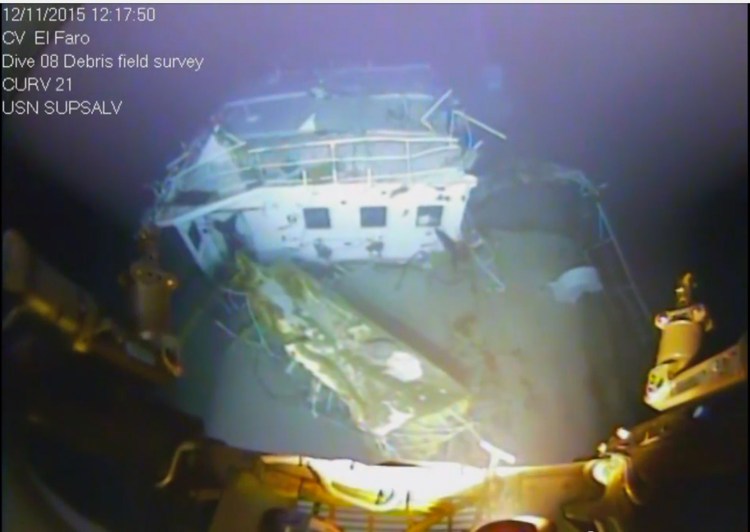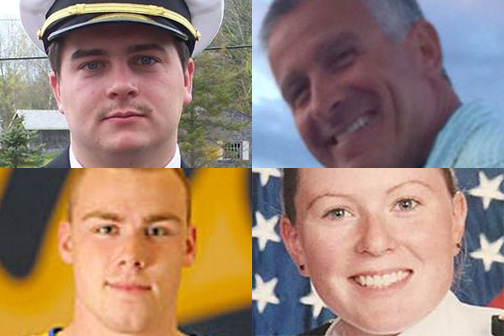Using new equipment over a larger area, the National Transportation Safety Board will make a second attempt to find the voyage data recorder from El Faro, the cargo ship that sank in October, killing its 33 crew members, including four Mainers.
The renewed search for the voyage data recorder – the equivalent of an airplane’s black box – is expected to begin in April. The exact date will be announced later, the NTSB said Thursday.
It’s unusual for the agency to have such difficulty finding a voyage data recorder, so multiple searches are rarely necessary, said spokesman Peter Knudson.
He said equipment provided by the Woods Hole Oceanographic Institution has improved the chances of recovering it. The equipment also can take high-quality images of the wreckage that could help with the investigation.
The voyage data recorder that was mounted on the El Faro could record conversations on the ship’s navigation bridge, where the crew members would have been as they tried to keep the ship from sinking.
“The voyage data recorder may hold vital information about the challenges encountered by the crew in trying to save the ship,” said Christopher A. Hart, the board’s chairman, in a news release. “Getting that information could be very helpful to our investigation.”
The ship, which sank on Oct. 1 during Hurricane Joaquin, was located Oct. 31 near the Bahamas in about 15,000 feet of water.
Film of the wreckage taken from a remotely operated vehicle showed that the navigation bridge structure, where the voyage data recorder was mounted, had separated from the ship. The bridge was later found, but not the recorder.
In the upcoming search, an autonomous underwater vehicle equipped with sonar and a camera, as well as other sensors, will document a 13.5-square-mile search area with photos and video.
Called Sentry, the vehicle, which can operate at nearly 20,000 feet, will launch from the Atlantis, a research vessel that’s owned by the Navy and operated by the Woods Hole Oceanographic Institution.
If the data recorder is found, another mission will be launched to recover it.
On Tuesday, the Coast Guard will begin a public hearing as part of its investigation into the sinking of the container ship.
The first phase of the hearing, to be held Feb. 16-26 at a convention center in Jacksonville, Florida, will focus on pre-accident events, including the regulatory compliance record of the El Faro, crew members’ duties and qualifications, and past operations of the vessel. A second, yet-to-be scheduled session will examine the ship’s last voyage, including cargo loading, weather conditions and navigation.
The Coast Guard said it will try to determine what factors led to the accident, whether there is evidence of misconduct, inattention to duty or negligence, or whether a willful violation of the law by any licensed mariner contributed to the sinking. The hearing will also serve to determine whether any Coast Guard personnel or agent of the government caused or contributed to a casualty.
The El Faro left Jacksonville on Sept. 29, bound for San Juan, Puerto Rico. At the time, Hurricane Joaquin was still classified as a tropical storm. On the 790-foot ship were 391 containers topside and 294 trailers and vehicles below deck. The National Weather Service issued an advisory upgrading Joaquin to hurricane status while the ship was several hundred miles into its voyage.
The vessel remained on its course through seven more hurricane advisories over the next 21 hours. On Oct. 1, it lost propulsion and was unable to move from its location as Joaquin grew to a Category 4 hurricane, with winds as strong as 130 mph.
Members of the crew from Maine were Danielle Randolph, 34, of Rockland; Dylan Meklin, 23, of Rockland; Michael Davidson of Windham, the captain; and Michael Holland, 25, of Wilton.
All were graduates of Maine Maritime Academy, as was a fifth crew member, Mitchell Kuflik of Brooklyn, New York.
Families of 10 of the crew members who died, including Davidson’s wife, Teresa, each accepted a settlement of $500,000 for pre-death pain and suffering, and will receive a payout for economic losses, though court records didn’t specify an amount.
Davidson’s family was the only one from Maine to agree to the settlement offered by the El Faro’s owners – Sea Star Lines LLC, doing business as TOTE Maritime Puerto Rico and TOTE Services Inc.
The families of Randolph and Meklin have joined legal efforts to block the ship’s owners from limiting their liability in the sinking, their attorney said in December, the deadline for them to sue.
U.S. District Court in Jacksonville ruled in November that TOTE’s liability was capped at about $15 million.
Send questions/comments to the editors.





Comments are no longer available on this story